北师大版(2019)必修 第三册Unit 9 Learning Lesson 2 Language Learning Tips 课件(共22张PPT,内镶嵌音频)
文档属性
| 名称 | 北师大版(2019)必修 第三册Unit 9 Learning Lesson 2 Language Learning Tips 课件(共22张PPT,内镶嵌音频) |
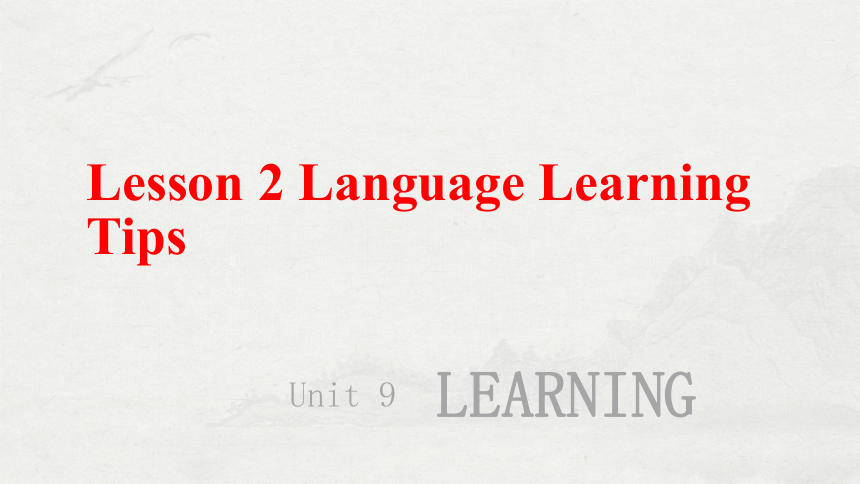
|
|
| 格式 | pptx | ||
| 文件大小 | 15.5MB | ||
| 资源类型 | 教案 | ||
| 版本资源 | 北师大版(2019) | ||
| 科目 | 英语 | ||
| 更新时间 | 2024-03-26 10:27:19 | ||
图片预览

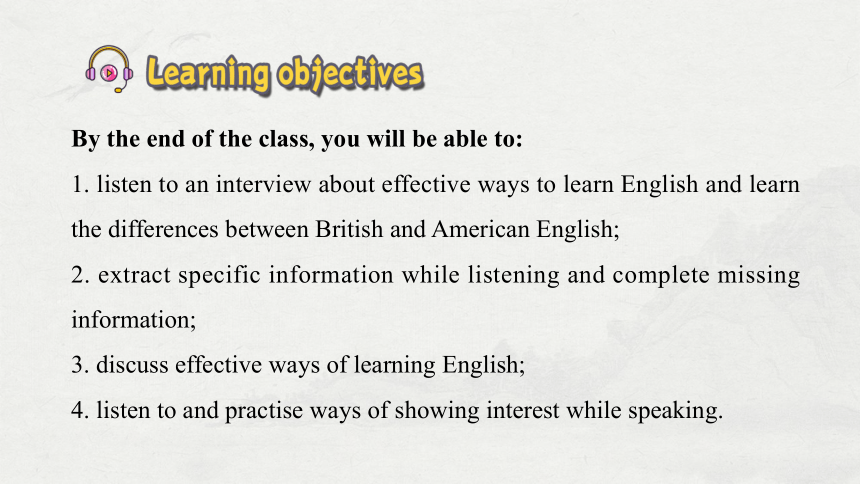
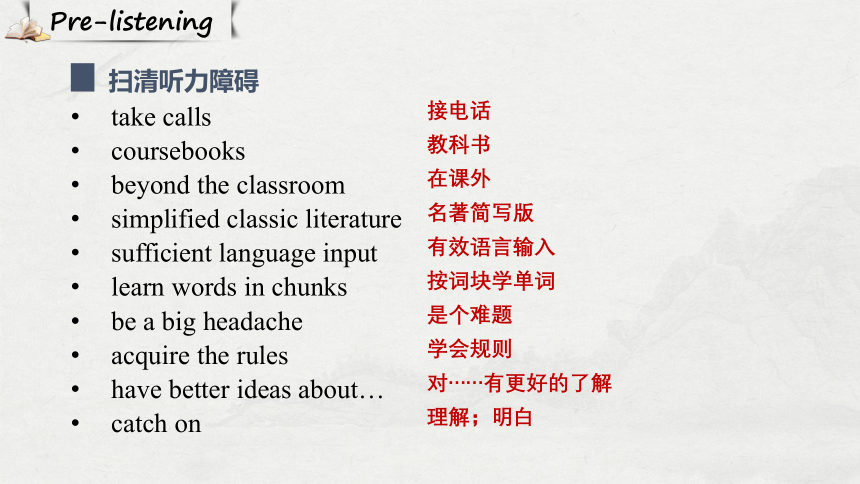
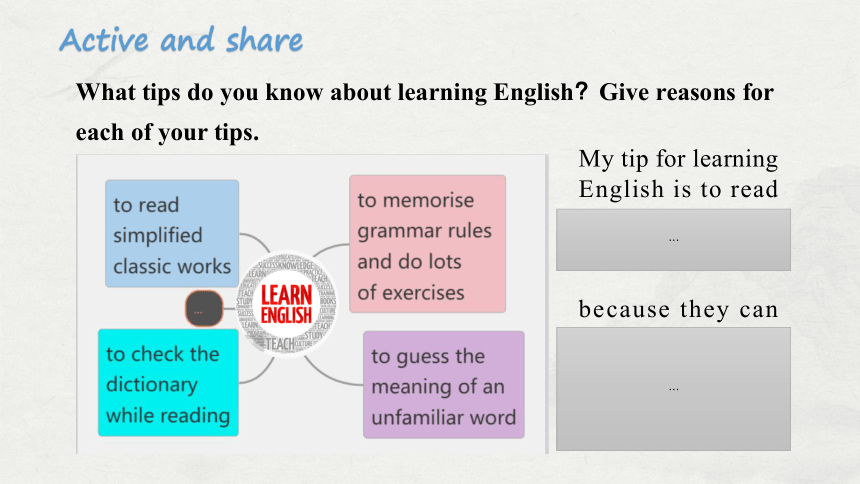

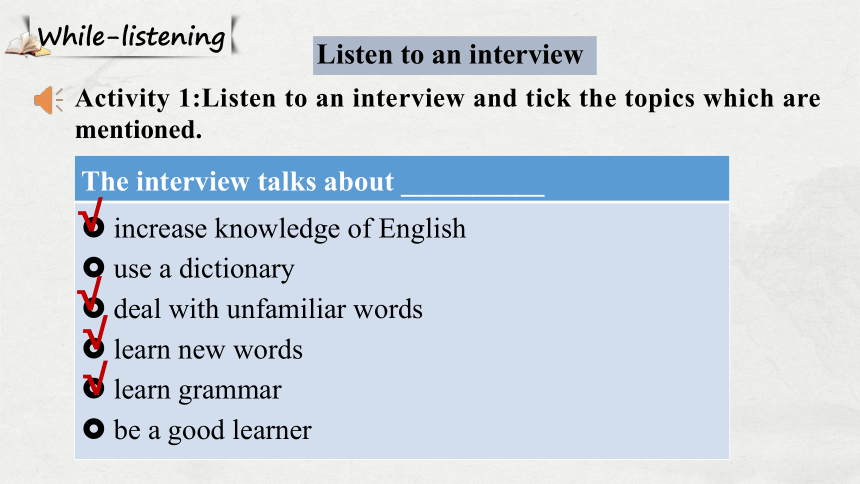

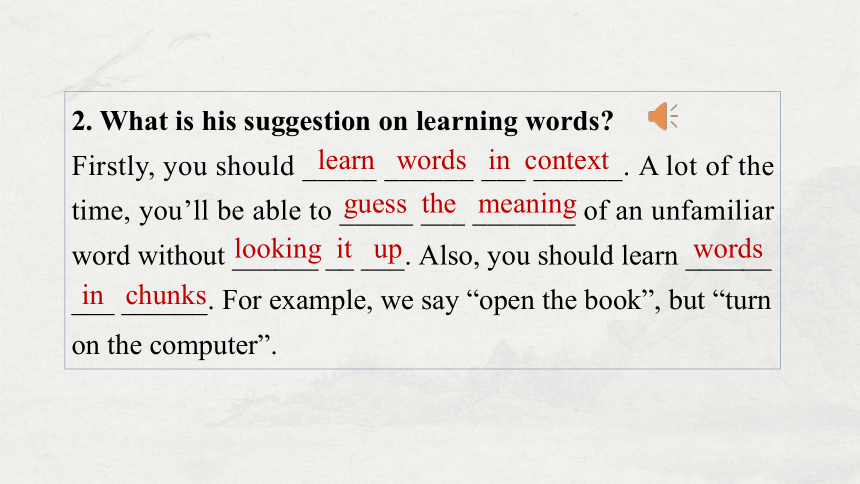
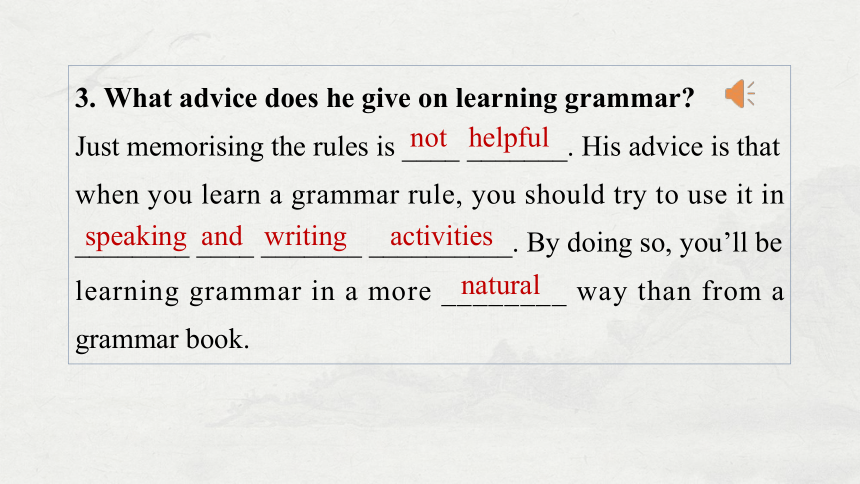
文档简介
(共22张PPT)
Unit 9
LEARNING
Lesson 2 Language Learning Tips
By the end of the class, you will be able to:
1. listen to an interview about effective ways to learn English and learn the differences between British and American English;
2. extract specific information while listening and complete missing information;
3. discuss effective ways of learning English;
4. listen to and practise ways of showing interest while speaking.
扫清听力障碍
take calls
coursebooks
beyond the classroom
simplified classic literature
sufficient language input
learn words in chunks
be a big headache
acquire the rules
have better ideas about…
catch on
接电话
教科书
在课外
名著简写版
有效语言输入
按词块学单词
是个难题
学会规则
对……有更好的了解
理解;明白
Pre-listening
What tips do you know about learning English?Give reasons for each of your tips.
My tip for learning English is to read simplified classic works
because they can increase my
knowledge of English beyond
the classroom.
···
···
Active and share
Listen to an interview.
Activity 1:Listen to an interview and tick the topics which are mentioned.
The interview talks about __________
increase knowledge of English
use a dictionary
deal with unfamiliar words
learn new words
learn grammar
be a good learner
√
√
√
√
While-listening
Listen to an interview
1. What is Dr. Smith’s advice on effective English learning
Dr. Smith’s advice is to _______ _____ __________ of English beyond the classroom. One way to do that is ___ _______ _____. He recommends that you try _________ ______ _________. The other way is to ______ _____.
increase your knowledge
listen
by
reading more
simplified
classic literature
Activity 2: Listen again and complete the missing information.
more
2. What is his suggestion on learning words
Firstly, you should _____ ______ ___ ______. A lot of the time, you’ll be able to _____ ___ _______ of an unfamiliar word without ______ __ ___. Also, you should learn ______ ___ ______. For example, we say “open the book”, but “turn on the computer”.
learn words in context
guess the meaning
looking it up
words
in chunks
3. What advice does he give on learning grammar
Just memorising the rules is ____ _______. His advice is that when you learn a grammar rule, you should try to use it in ________ ____ _______ __________. By doing so, you’ll be learning grammar in a more ________ way than from a grammar book.
natural
not helpful
speaking and writing
activities
(=interviewer DS=Dr. Smith C1=Caller 1 Y=Yang An S=Su Qin)
I: Welcome to today’s programme. We’ve invited Dr. Smith to share with us effectivestrategies for learning English. Hello, Dr. Smith, many of our listeners have questions about learning English. I suppose you’re ready to take calls from our listeners. So start phoning in!
C1: Hello, Dr. Smith. I’ve spent a lot of time reading English coursebooks, but I’ve made little progress. My question is how to learn English effectively.
Listening text
DS: Well, my advice is to increase your knowledge of English beyond the classroom. One way to do that is by reading more. I would recommend that you try simplified classic literature, such as short stories and novels rewritten in simple English. The other way is to listen more, for example, listening to English programmes. With sufficient language input, I’m sure you can learn English effectively.
Y: Hello, Dr. Smith. My name is Yang An. I find memorising new words very difficult.
DS: Hi, Yang An. So what do you normally do to memorise new words
Y: I just try to memorise the word list and it is so difficult and boring.
DS: Well, I don’t think memorising the word list is the best way to learn words. First, you should learn words in context. For example, when reading English stories, try to keep reading on even when you come across some new words. A lot of the time, you’ll be able to guess the meaning of an unfamiliar word without looking it up. Also, you should learn words in chunks. For example, we say “open the book”, but “turn on the computer”. Or we say “eat an apple”, but “take the medicine”.
Y: OK. I see. So I need to learn words in context and in chunks. Thank you very much.
S: Hello, Dr. Smith. I’m Su Qin. Learning grammar is a big headache for me. I’ve put so much time in memorising grammar rules and doing a lot of exercises, but my English is still really bad.
DS: Hi, Su Qin. Just memorising the rules is not helpful. My advice is that when you learn a grammar rule, you should try to use it in speaking and writing activities. By doing so, you’ll be learning grammar in a more natural way than from a grammar book. Very slowly, you will start to acquire the rules and use them without thinking.
S: Ah! I’ll try this and see how it goes. Thank you very much.
I: Thank you, Dr. Smith, for joining us today. I’m sure our audience has better ideas about how to learn English effectively now.
1. Do you find Dr. Smith’s advice helpful
2. What are other ways to learn English vocabulary and grammar effectively
Writing and rewriting can be helpful.
Translating and back translating can also be helpful.
Watching movies and TV series and dubbing is another possible way.
Yes, they are very helpful when we are learning English.
Discussion
Post-listening
Listen to the programme.
Activity 1: Listen to the programme twice and complete the notes in the table.
Aspects Examples
ways of pronouncing words water, tomato, _________, ______________________
uses of words _____________, _____________,
____________________________
life/elevator
football/soccer
subway/underground (tube)
example
dancing in the classroom
Listen to the programme
While-listening
Activity 2: Listen and plete the sentences in the Talk Builder.
1. —We have different ways of pronouncing words. For example, ...
—That’s odd! _____________________ Do they still mean the
same thing
2. —I say “example” and “dancing in the classroom”, but Robert...
—_____ How do people ...
3. —We say “lift”, but Americans say “elevator”.
—_____________
4. —The American “subway” is called the “underground” in the UK,
or the “tube” in London.
—________ I never realised...
They sound so different!
Ah!
Interesting!
Wow!
(L=Liang Wei P=Pam R=Robert)
L: English is spoken in many areas of the world, for example, the US, the UK, Australia and New Zealand. Therefore, the English language may be used slightly differently from one country to another. English speakers in different areas may also have different speaking habits. Today, we’re honoured to have two special guests with us to tell us about this.
P: Hey there! I’m Pam, from the US.
R: Hello, nice to meet you. I’m Robert, from the UK.
Listening text
L: Nice to meet you, Pam and Robert. Can you tell us the differences between American English and British English
P: Well, I’m American and Robert is British, so we have different ways of pronouncing words. For example, British people say “water” and “tomato” but Americans say “water” and “tomato”!
L: That’s odd!They sound so different!Do they still mean the same thing
P: They do. Let me think of some other examples for you. Ah, I say “example” and “dancing in the classroom”, but Robert says ...
R: “Example” and “dancing in the classroom”.
L: Ah! How do people understand each other when words are pronounced so differently
P: The more you listen, the easier it is to catch on.
R: Apart from pronunciation, we use different words for describing the same things. For example, we say “lift” but Americans say “elevator”. We say “football” and Americans say “soccer”!
L: Interesting!
R: Let me tell you a joke. In London, if you ask the local people, “Where is the nearest subway ”, you may end up in a fast food restaurant! The American “subway” is called the “underground” in the UK, or the “tube” in London.
L: Wow! I never realised that British and American English were so different!
P: Well, don’t worry. Though they are different in one way or another, people have no difficulty in understanding each other. There are other ways to communicate—smiling is a worldwide language!
R: That’s right!
Act out a dialogue between an expert and a learner talking about differences between British and American English. The expert gives examples and the learner responds with interest.
Pair Work
Post-listening
Search online to find more differences between British and American English.
Homework
Unit 9
LEARNING
Lesson 2 Language Learning Tips
By the end of the class, you will be able to:
1. listen to an interview about effective ways to learn English and learn the differences between British and American English;
2. extract specific information while listening and complete missing information;
3. discuss effective ways of learning English;
4. listen to and practise ways of showing interest while speaking.
扫清听力障碍
take calls
coursebooks
beyond the classroom
simplified classic literature
sufficient language input
learn words in chunks
be a big headache
acquire the rules
have better ideas about…
catch on
接电话
教科书
在课外
名著简写版
有效语言输入
按词块学单词
是个难题
学会规则
对……有更好的了解
理解;明白
Pre-listening
What tips do you know about learning English?Give reasons for each of your tips.
My tip for learning English is to read simplified classic works
because they can increase my
knowledge of English beyond
the classroom.
···
···
Active and share
Listen to an interview.
Activity 1:Listen to an interview and tick the topics which are mentioned.
The interview talks about __________
increase knowledge of English
use a dictionary
deal with unfamiliar words
learn new words
learn grammar
be a good learner
√
√
√
√
While-listening
Listen to an interview
1. What is Dr. Smith’s advice on effective English learning
Dr. Smith’s advice is to _______ _____ __________ of English beyond the classroom. One way to do that is ___ _______ _____. He recommends that you try _________ ______ _________. The other way is to ______ _____.
increase your knowledge
listen
by
reading more
simplified
classic literature
Activity 2: Listen again and complete the missing information.
more
2. What is his suggestion on learning words
Firstly, you should _____ ______ ___ ______. A lot of the time, you’ll be able to _____ ___ _______ of an unfamiliar word without ______ __ ___. Also, you should learn ______ ___ ______. For example, we say “open the book”, but “turn on the computer”.
learn words in context
guess the meaning
looking it up
words
in chunks
3. What advice does he give on learning grammar
Just memorising the rules is ____ _______. His advice is that when you learn a grammar rule, you should try to use it in ________ ____ _______ __________. By doing so, you’ll be learning grammar in a more ________ way than from a grammar book.
natural
not helpful
speaking and writing
activities
(=interviewer DS=Dr. Smith C1=Caller 1 Y=Yang An S=Su Qin)
I: Welcome to today’s programme. We’ve invited Dr. Smith to share with us effectivestrategies for learning English. Hello, Dr. Smith, many of our listeners have questions about learning English. I suppose you’re ready to take calls from our listeners. So start phoning in!
C1: Hello, Dr. Smith. I’ve spent a lot of time reading English coursebooks, but I’ve made little progress. My question is how to learn English effectively.
Listening text
DS: Well, my advice is to increase your knowledge of English beyond the classroom. One way to do that is by reading more. I would recommend that you try simplified classic literature, such as short stories and novels rewritten in simple English. The other way is to listen more, for example, listening to English programmes. With sufficient language input, I’m sure you can learn English effectively.
Y: Hello, Dr. Smith. My name is Yang An. I find memorising new words very difficult.
DS: Hi, Yang An. So what do you normally do to memorise new words
Y: I just try to memorise the word list and it is so difficult and boring.
DS: Well, I don’t think memorising the word list is the best way to learn words. First, you should learn words in context. For example, when reading English stories, try to keep reading on even when you come across some new words. A lot of the time, you’ll be able to guess the meaning of an unfamiliar word without looking it up. Also, you should learn words in chunks. For example, we say “open the book”, but “turn on the computer”. Or we say “eat an apple”, but “take the medicine”.
Y: OK. I see. So I need to learn words in context and in chunks. Thank you very much.
S: Hello, Dr. Smith. I’m Su Qin. Learning grammar is a big headache for me. I’ve put so much time in memorising grammar rules and doing a lot of exercises, but my English is still really bad.
DS: Hi, Su Qin. Just memorising the rules is not helpful. My advice is that when you learn a grammar rule, you should try to use it in speaking and writing activities. By doing so, you’ll be learning grammar in a more natural way than from a grammar book. Very slowly, you will start to acquire the rules and use them without thinking.
S: Ah! I’ll try this and see how it goes. Thank you very much.
I: Thank you, Dr. Smith, for joining us today. I’m sure our audience has better ideas about how to learn English effectively now.
1. Do you find Dr. Smith’s advice helpful
2. What are other ways to learn English vocabulary and grammar effectively
Writing and rewriting can be helpful.
Translating and back translating can also be helpful.
Watching movies and TV series and dubbing is another possible way.
Yes, they are very helpful when we are learning English.
Discussion
Post-listening
Listen to the programme.
Activity 1: Listen to the programme twice and complete the notes in the table.
Aspects Examples
ways of pronouncing words water, tomato, _________, ______________________
uses of words _____________, _____________,
____________________________
life/elevator
football/soccer
subway/underground (tube)
example
dancing in the classroom
Listen to the programme
While-listening
Activity 2: Listen and plete the sentences in the Talk Builder.
1. —We have different ways of pronouncing words. For example, ...
—That’s odd! _____________________ Do they still mean the
same thing
2. —I say “example” and “dancing in the classroom”, but Robert...
—_____ How do people ...
3. —We say “lift”, but Americans say “elevator”.
—_____________
4. —The American “subway” is called the “underground” in the UK,
or the “tube” in London.
—________ I never realised...
They sound so different!
Ah!
Interesting!
Wow!
(L=Liang Wei P=Pam R=Robert)
L: English is spoken in many areas of the world, for example, the US, the UK, Australia and New Zealand. Therefore, the English language may be used slightly differently from one country to another. English speakers in different areas may also have different speaking habits. Today, we’re honoured to have two special guests with us to tell us about this.
P: Hey there! I’m Pam, from the US.
R: Hello, nice to meet you. I’m Robert, from the UK.
Listening text
L: Nice to meet you, Pam and Robert. Can you tell us the differences between American English and British English
P: Well, I’m American and Robert is British, so we have different ways of pronouncing words. For example, British people say “water” and “tomato” but Americans say “water” and “tomato”!
L: That’s odd!They sound so different!Do they still mean the same thing
P: They do. Let me think of some other examples for you. Ah, I say “example” and “dancing in the classroom”, but Robert says ...
R: “Example” and “dancing in the classroom”.
L: Ah! How do people understand each other when words are pronounced so differently
P: The more you listen, the easier it is to catch on.
R: Apart from pronunciation, we use different words for describing the same things. For example, we say “lift” but Americans say “elevator”. We say “football” and Americans say “soccer”!
L: Interesting!
R: Let me tell you a joke. In London, if you ask the local people, “Where is the nearest subway ”, you may end up in a fast food restaurant! The American “subway” is called the “underground” in the UK, or the “tube” in London.
L: Wow! I never realised that British and American English were so different!
P: Well, don’t worry. Though they are different in one way or another, people have no difficulty in understanding each other. There are other ways to communicate—smiling is a worldwide language!
R: That’s right!
Act out a dialogue between an expert and a learner talking about differences between British and American English. The expert gives examples and the learner responds with interest.
Pair Work
Post-listening
Search online to find more differences between British and American English.
Homework
同课章节目录
- Unit 7 Art
- Lesson 1 Masterpieces
- Lesson 2 Beijing Opera
- Lesson 3 A Musical Genius
- Unit 8 Green living
- Lesson 1 Roots and Shoots
- Lesson 2 Greening the Desert
- Lesson 3 "White Bikes" on the Road
- Unit 9 Learning
- Lesson 1 Active Learning
- Lesson 2 Language Learning Tips
- Lesson 3 The Secrets of Your Memory
